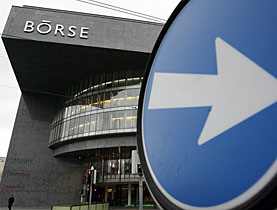Swiss offer firms haven from British tax hikes

Over the past few months prime British companies and high earners have reportedly threatened to pick up sticks and relocate to Switzerland to avoid rising taxes.
From April, a 50 per cent tax rate for those earning more than £150,000 (SFr242,000) comes into force. Britain, which for years appeared to encourage personal wealth, is now being described as a “hostile environment” for the rich.
Banks and hedge fund firms have been the main focus of reports about potential company relocations. But at the beginning of March, the chemical manufacturer Ineos announced it was thinking about shifting its global headquarters from England to Switzerland for tax purposes.
Britain’s largest privately held company believes the potential saving for the business would be quite significant.
“We estimate a saving of €450 million (SFr650 million) on tax charges between now and 2014 by relocating,” Ineos spokesman Richard Longden told swissinfo.ch. “This would enable us to reinvest within the business and improve our long-term competitiveness.”
However, the giant chemical maker remains committed to its 3,700 workforce in Britain and only around 20 of the 170 employees at the company’s current headquarters in Lyndhurst would initially make the move to Switzerland.
Mass exodus?
Switzerland’s low corporate tax rates have for some years persuaded foreign firms, principally from the United States, to set up or move European headquarters and administrative holding companies inside Swiss borders.
This trend to set up low maintenance satellite offices in Switzerland seems to be mirrored in the financial sector. Banks and hedge funds have been shouting loudest in recent months about a mass migration out of London’s square mile.
Yet, the idea that wealthy city traders would quit the City in their droves for an alpine tax haven has not as yet materialised.
Some complain that this threat from companies to relocate en masse was always intended to be no more than a move of name and a ruse to dodge taxes.
“They are using legal mechanisms to evade paying tax in the countries where the profits are actually generated,” said John Christensen, director of the London-based Tax Justice Network, a tax reform lobbying group. “Very often it’s just some sort of caretaker dressed up as a secretary who actually resides in these places.”
“This, for us, is a sign of a massively broken financial architecture.” he told swissinfo.ch.
London remains financial hub
London is still considered the principal powerhouse of finance in Europe. Eighty per cent of Europe’s hedge funds are currently based in the British capital and there is compelling logic for companies to be situated near other institutions, banks and legal services.
A Swiss government report late last year admitted the country could not “match the force of attraction and integration of international centres like London for hiring talent from all over the world”.
There is also a worry that proposed European Union reforms of the alternative investment industry may impede hedge funds working from Switzerland.
However, such concerns have not stopped relocation specialists investing time and money to promote opportunities for finance managers in Switzerland.
Last month, dozens of executives attended a Switzerland for Hedge Funds briefing in London’s Mayfair, the affluent heart of London’s alternative investment industry. Marc Rudolf from the Greater Zurich Area business promotion agency offered advice for those interested in moving.
“We were there holding up the flag and saying: ‘Hi, if you are thinking about moving away from the UK don’t just think of Ireland, Singapore and Malta, think of Switzerland’,” Rudolf told swissinfo.ch.
Uncertainty fuels doubt
Some of the German-speaking cantons around Zurich can offer tax rates that never exceed 20 per cent.
By contrast, a recent report by tax specialists KPMG found that high earners in London will be the most taxed of any other financial centre when the 50 per cent top rate comes into force. London will leapfrog Geneva as a more expensive place for high flyers to work, while Zurich will remain towards the bottom of the list.
While Rudolf admits that most attending the Mayfair meeting were simply curious about relocating to Switzerland, he was aware of a continuing sense of unease in Britain’s financial sector.
“The whole issue is not only about taxes, it is also about insecurity – not being able to plan ahead,” he said.
“People in the UK are afraid of what might be coming, be it Gordon Brown as prime minister, or David Cameron. Debt in the UK and the budget deficit all point in the direction that taxes, if anything, will not decrease.”
Many British-based companies will be keeping a close eye on the impending British General Election. The outcome of that contest and the statements later issued from Downing Street, particularly on tax, may yet be the difference between some firms staying in Britain or moving to Switzerland.
Andrew Littlejohn in London, swissinfo.ch (with input from Matthew Allen)
Switzerland has for years sought to attract global firms by offering competitively low corporate tax rates.
Swiss cantons, that set their own rates, compete to attract European headquarters or holding companies within their borders. Smaller cantons, such as Zug or Schwyz, have been particularly successful with their campaigns.
British chemicals company Ineos could follow in the footsteps of food manufacturer Kraft or internet giant Google in setting up or expanding operations in Switzerland in the last few years.
However, Switzerland’s system of tax competition – effectively undercutting the rates of neighbouring countries – has drawn criticism from the European Union.
The EU considers the practice to be in violation of a 1972 free trade agreement signed between the European bloc and Switzerland. The Swiss have denied this is the case, but the row rumbles on despite a lull in proceedings in the last 18 months.
Three years ago, Switzerland stated its intention of attracting hedge fund managers from London. This drive has been slowed by the financial crisis and could be threatened by proposed new EU legislation, that has been labelled “protectionist” by Switzerland.
Many EU countries, led by France and Germany, want to clip the wings of the alternative investment industry with a series of reforms. Part of the proposed new regulations would effectively freeze hedge funds operating in Switzerland out of the EU market.
Ironically, Britain could prove a vital ally to the Swiss as Prime Minister Gordon Brown is opposed to the planned reforms and may succeed in having them watered down or scrapped.

In compliance with the JTI standards
More: SWI swissinfo.ch certified by the Journalism Trust Initiative












You can find an overview of ongoing debates with our journalists here . Please join us!
If you want to start a conversation about a topic raised in this article or want to report factual errors, email us at english@swissinfo.ch.